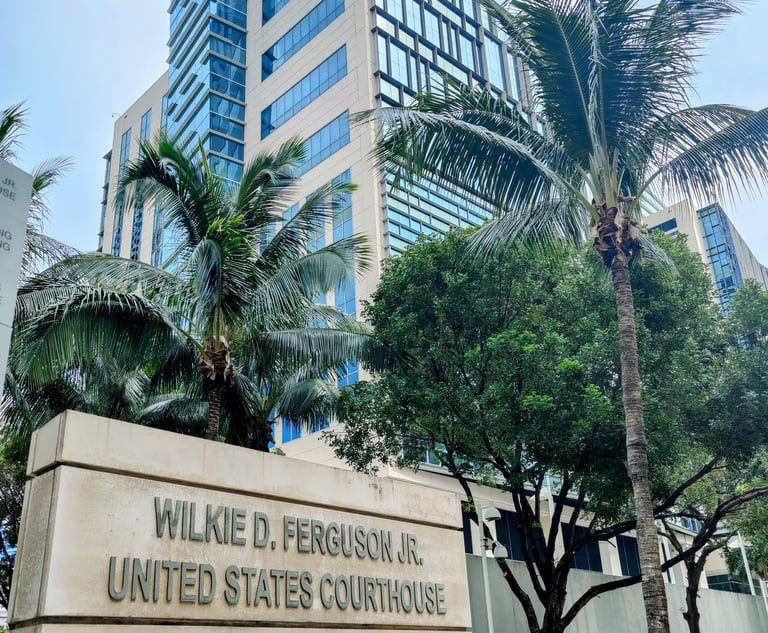 Florida State Sen. Tom Lee (R)/courtesy photo
Florida State Sen. Tom Lee (R)/courtesy photoE-Verify Sponsor Says Change Makes 'Mockery' of Proposal
Sen. Tom Lee said the provision is so "ridiculous" that he would ask Gov. Ron DeSantis, who has prioritized the E-Verify issue, to veto the current version of the bill if it passes the Legislature.
February 19, 2020 at 01:04 PM
5 minute read
A key Republican lawmaker who is pushing to require all Florida employers to do federal immigration background checks on new hires said his bill has become a "mockery" of what the proposal should be.
Sen. Tom Lee, R-Thonotosassa, wants his proposal to require all public and private employers in the state to use E-Verify, a federal program that checks the legal eligibility of new workers.
But "in the spirit of compromise," he asked the Senate Commerce and Tourism Committee on Tuesday to revise his bill (SB 664) to allow public and private employers to use a system that is "substantially equivalent" to E-Verify to be in compliance with the proposed law.
"It pretty much guts the bill. … All [employers] would have to do is certify that they believe in their heart that they've got a system that is equally as effective. But who knows what is in their heart?" Lee told reporters after the committee meeting.
Lee said the provision is so "ridiculous" that he would ask Gov. Ron DeSantis, who has prioritized the E-Verify issue, to veto the current version of the bill if it passes the Legislature.
"I think he'll veto it. I would tell him to veto it. I think it makes a mockery of our efforts to try to create an E-Verify system in Florida," Lee told reporters after the committee voted 3-2 for the revised bill.
The E-Verify proposal is the most-contentious immigration issue facing lawmakers this legislation session, as they head into the 2020 election cycle where President Donald Trump is at the top of the ticket.
DeSantis and the Republican Party of Florida have put the full weight of the party behind trying to implement an E-Verify mandate for all employers. The idea is popular among members of the GOP base who want to crack down on illegal immigration, and DeSantis made it a top promise during his 2018 gubernatorial campaign.
"Mandatory E-Verify for all Florida employers would stop illegal aliens from coming here and, over time, cause the illegal aliens already here to leave (the state)," Robert Windham, with Floridians for E-Verify Now, said at Tuesday's committee meeting.
But influential business groups, some of them major GOP donors, have been pushing back against the proposal, just like they did in past years.
Sen Victor Torres, D-Orlando, sympathized with businesses and argued an E-Verify mandate would hurt the state's economy.
"Many businesses are having difficulty finding workers to fill the jobs that are currently vacant. This bill would further limit their employment choices, which could be disastrous to our state economy," Torres said Tuesday before voting against the proposal.
This year, the proposal has been moving in the Senate, but Lee has been forced to make changes to keep it alive.
The key changes made to the bill on Tuesday include allowing employers to use an alternative system to check the legal eligibility of workers and removing an exemption for the agriculture industry to check the status of workers.
Lee's proposal would also phase in the requirement to use a verification system. The mandate would first start in July 2021 for employers with at least 500 workers and would apply to employers with at least 20 workers starting in January 2022.
Under the current version of the bill, employers would be able to certify under the penalty of perjury that they are not hiring undocumented immigrants. That provision would apply to private employers and government employers at the state, county and local levels.
To meet the mandate, employers would need to keep all records used to establish employees' legal eligibility to work in the United States for at least three years.
Lee said he was not "at liberty to say" who is behind the provision, but during the committee meeting, he said the change was made "in the spirit of compromise."
"There are a lot of cooks in the kitchen and some of them are not coming out of the closet to talk on the record about it," Lee told reporters.
Sen. David Simmons, who last week pushed to carve out the agriculture industry from the bill, was sitting in the committee room when Lee's proposal was revised Tuesday to take the agriculture exemption out.
Simmons is part of Senate leadership but is not a member of the Commerce and Tourism Committee. As a result, he did not vote on the bill. He told The News Service of Florida he attended the meeting because he was "working to help Sen. Lee with drafting language."
"It is my understanding that Sen. Simmons worked on the amendment," Katie Betta, a Senate spokeswoman said in an email, adding it "did not come" from Senate President Bill Galvano's office.
Senate Commerce and Tourism Chairman Joe Gruters, who doubles as head of the Republican Party of Florida, voted against the amendment and expects more "adjustments" to come as the measure heads to its final committee in the Senate.
"The bill is alive, and we will get more opportunities to make it even better," Gruters said in a text message.
Meanwhile, in the House, a bill that would exempt private businesses from the E-Verify requirement has not moved forward.
Ana Ceballos reports for the News Service of Florida.
This content has been archived. It is available through our partners, LexisNexis® and Bloomberg Law.
To view this content, please continue to their sites.
Not a Lexis Subscriber?
Subscribe Now
Not a Bloomberg Law Subscriber?
Subscribe Now
NOT FOR REPRINT
© 2024 ALM Global, LLC, All Rights Reserved. Request academic re-use from www.copyright.com. All other uses, submit a request to [email protected]. For more information visit Asset & Logo Licensing.
You Might Like
View All
'Close Our Borders?' Senate Judiciary Committee Examines Economics, Legal Predicate for Mass Deportation Proposal
3 minute read

'Stab Venequip in the Back': Caterpillar Faces $100M Lawsuit in Miami Federal Court
3 minute read
Another Roundup Trial Kicks Off in Missouri. Monsanto Faces 3 Plaintiffs
4 minute readTrending Stories
- 1Call for Nominations: Elite Trial Lawyers 2025
- 2Senate Judiciary Dems Release Report on Supreme Court Ethics
- 3Senate Confirms Last 2 of Biden's California Judicial Nominees
- 4Morrison & Foerster Doles Out Year-End and Special Bonuses, Raises Base Compensation for Associates
- 5Tom Girardi to Surrender to Federal Authorities on Jan. 7
Who Got The Work
Michael G. Bongiorno, Andrew Scott Dulberg and Elizabeth E. Driscoll from Wilmer Cutler Pickering Hale and Dorr have stepped in to represent Symbotic Inc., an A.I.-enabled technology platform that focuses on increasing supply chain efficiency, and other defendants in a pending shareholder derivative lawsuit. The case, filed Oct. 2 in Massachusetts District Court by the Brown Law Firm on behalf of Stephen Austen, accuses certain officers and directors of misleading investors in regard to Symbotic's potential for margin growth by failing to disclose that the company was not equipped to timely deploy its systems or manage expenses through project delays. The case, assigned to U.S. District Judge Nathaniel M. Gorton, is 1:24-cv-12522, Austen v. Cohen et al.
Who Got The Work
Edmund Polubinski and Marie Killmond of Davis Polk & Wardwell have entered appearances for data platform software development company MongoDB and other defendants in a pending shareholder derivative lawsuit. The action, filed Oct. 7 in New York Southern District Court by the Brown Law Firm, accuses the company's directors and/or officers of falsely expressing confidence in the company’s restructuring of its sales incentive plan and downplaying the severity of decreases in its upfront commitments. The case is 1:24-cv-07594, Roy v. Ittycheria et al.
Who Got The Work
Amy O. Bruchs and Kurt F. Ellison of Michael Best & Friedrich have entered appearances for Epic Systems Corp. in a pending employment discrimination lawsuit. The suit was filed Sept. 7 in Wisconsin Western District Court by Levine Eisberner LLC and Siri & Glimstad on behalf of a project manager who claims that he was wrongfully terminated after applying for a religious exemption to the defendant's COVID-19 vaccine mandate. The case, assigned to U.S. Magistrate Judge Anita Marie Boor, is 3:24-cv-00630, Secker, Nathan v. Epic Systems Corporation.
Who Got The Work
David X. Sullivan, Thomas J. Finn and Gregory A. Hall from McCarter & English have entered appearances for Sunrun Installation Services in a pending civil rights lawsuit. The complaint was filed Sept. 4 in Connecticut District Court by attorney Robert M. Berke on behalf of former employee George Edward Steins, who was arrested and charged with employing an unregistered home improvement salesperson. The complaint alleges that had Sunrun informed the Connecticut Department of Consumer Protection that the plaintiff's employment had ended in 2017 and that he no longer held Sunrun's home improvement contractor license, he would not have been hit with charges, which were dismissed in May 2024. The case, assigned to U.S. District Judge Jeffrey A. Meyer, is 3:24-cv-01423, Steins v. Sunrun, Inc. et al.
Who Got The Work
Greenberg Traurig shareholder Joshua L. Raskin has entered an appearance for boohoo.com UK Ltd. in a pending patent infringement lawsuit. The suit, filed Sept. 3 in Texas Eastern District Court by Rozier Hardt McDonough on behalf of Alto Dynamics, asserts five patents related to an online shopping platform. The case, assigned to U.S. District Judge Rodney Gilstrap, is 2:24-cv-00719, Alto Dynamics, LLC v. boohoo.com UK Limited.
Featured Firms
Law Offices of Gary Martin Hays & Associates, P.C.
(470) 294-1674
Law Offices of Mark E. Salomone
(857) 444-6468
Smith & Hassler
(713) 739-1250






